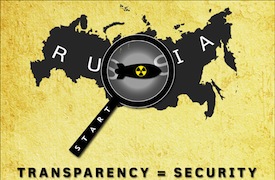Bipartisan National Security Leaders Back New START
June 24, 2010
Featured Image
We are happy to serve you a daily summary of the day's top nuclear policy stories each morning, with excerpts from the stories in bullet form.
Stories we're following today: Thursday, June 24, 2010
Transparency Equals Security - Partnership for a Secure America [link]
- Nuclear arms control is a critical pillar of America’s national security. Negotiated agreements to reduce the threat posed by the Cold War nuclear arms race have always enjoyed strong bipartisan support in the U.S.
- Now is the time for a thorough and balanced national discussion about nuclear arms control and nonproliferation. But we must remember that a world without a binding U.S.-Russian nuclear weapons agreement is a much more dangerous world.
- We, the undersigned Republicans and Democrats, support the new START treaty…
- The bipartisan group of signatories includes national security leaders Madeleine Albright, Colin Powell, George Shultz, Bill Perry, Frank Carlucci, Chuck Hagel, Sam Nunn, Thomas Kean, Lee Hamilton, and many more. [Read the full list of signatories]
Senate Republicans to Back Nuclear Arms Treaty - U.S. News & World Report [link]
- Word on the Hill is that the New START treaty got a surprise boost last week. Sources say several Republicans on the Foreign Relations Committee are now considering backing ratification of the arms treaty that the White House negotiated with Moscow earlier this year.
- Indiana Sen. Richard Lugar has already announced his support, and three others have hinted privately that they might be on board after heavyweights James Baker, Henry Kissinger, and Brent Scowcroft concurred that New START will not affect any U.S. missile defense plans, a key GOP objection to ratification.
U.S. Imposes New Penalties On Iran Firms And Officials - The New York Times [link]
- The Obama administration, seeking to build on the momentum of the Iran resolution passed last week by the United Nations, announced Wednesday that it had imposed sanctions on more than a dozen Iranian companies and individuals with links to the country's nuclear and missile programs.
- The list includes two top commanders of the Islamic Revolutionary Guards Corps… a major Iranian bank and five front companies for the Iranian state shipping line, as well as 71 ships with names that had been changed to skirt previous sanctions.
- Administration officials said they hoped the steps would be the first of a new round of sanctions against Iran by the European Union, Australia and other countries.
- The Treasury Department's sanctions lay bare the loopholes that continue to plague efforts to isolate Iran commercially: many of the companies on the list acted as fronts for entities already the subject of previous sanctions. Others have ties to entities that were already sanctioned.
Kremlinology in 140 Characters or Less - Robert Mackey of the New York Times [link]
- On Wednesday, during a visit to Silicon Valley, Mr. Medvedev made it even easier to practice at least an amateur version of Kremlinology by opening two new Twitter accounts for the Kremlin
- After posting the obligatory first message — “Hello everyone! I’m on Twitter, and this is my first tweet.” — Mr. Medvedev quickly got the hang of the new tool.
- In just a few hours, Mr. Medvedev has managed to attract more than 10,000 followers to both the Russian and English versions of the Kremlin account. Wisely, though, he seems to be exercising caution about whom he is following on the social network. He initially signed up to get feeds from just two other accounts — @BarackObama and @WhiteHouse.
A View from the Dark Side
Senate Republicans Find New START Agreement Problematic - Fred Barnes in the Weekly Standard [link]
- Ratification of the new nuclear arms treaty with the Russians may not be as easy as the White House, Senate Democrats, and the media appear to expect. The pact, called the New START agreement, faces early trouble in the Senate – serious trouble.
- Republicans, led by Senator John Kyl of Arizona, have balked at proceeding with consideration of the treaty until the Obama administration turns over the full record of negotiations with the Russians and follows through on its promise to fund modernization of the American nuclear arsenal.
- The suspicion among Republicans is that negotiators may have acceded to Russian demands on several issues, most notably missile defense. In a unilateral statement accompanying the treaty, the Russians claimed the right to withdraw from New START if American missile defense forces are upgraded “quantitatively or qualitatively.” The U.S. didn’t reject this claim, except to note that nothing would be done to missile defenses to upset the strategic balance between the two countries.



